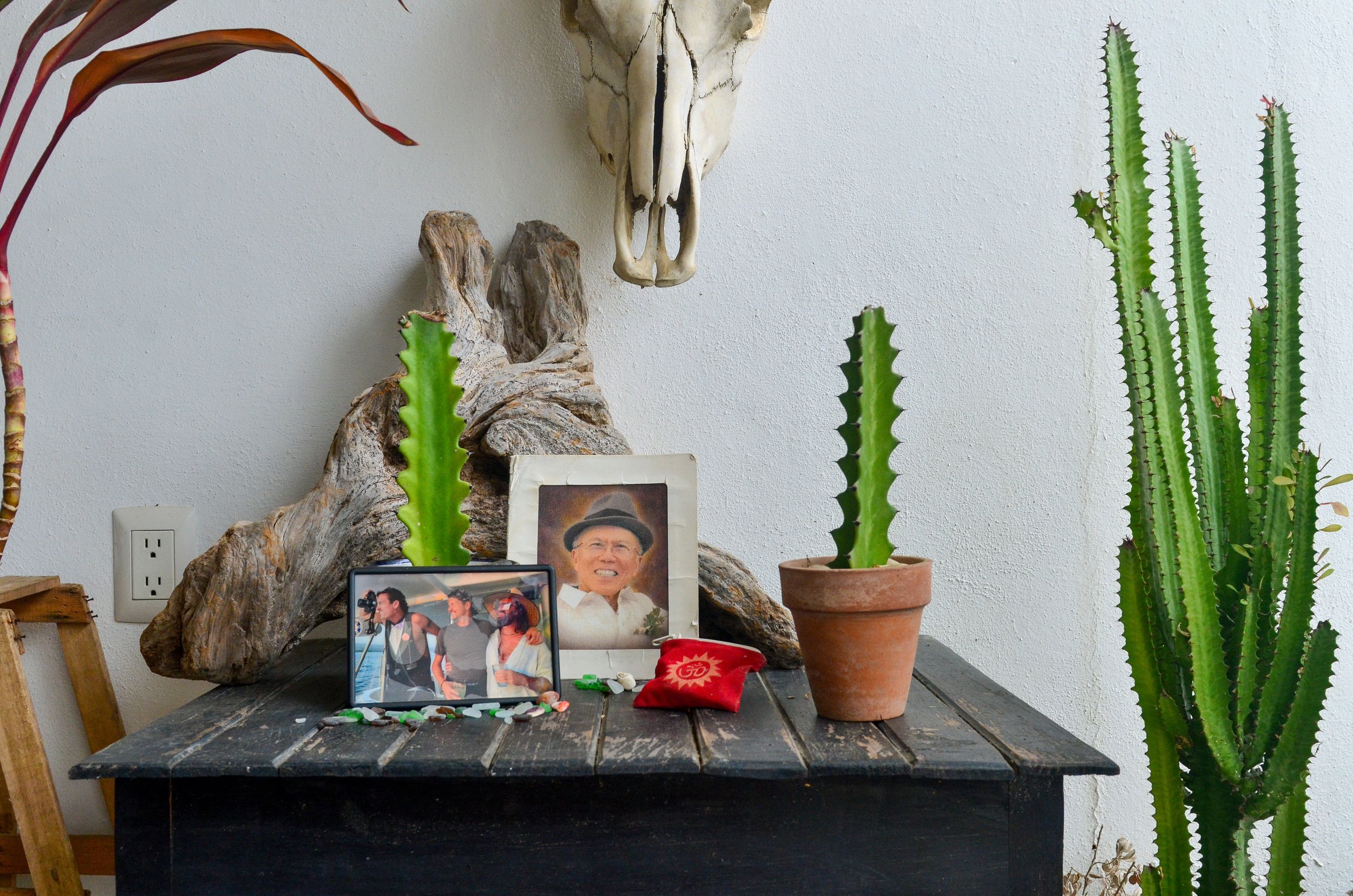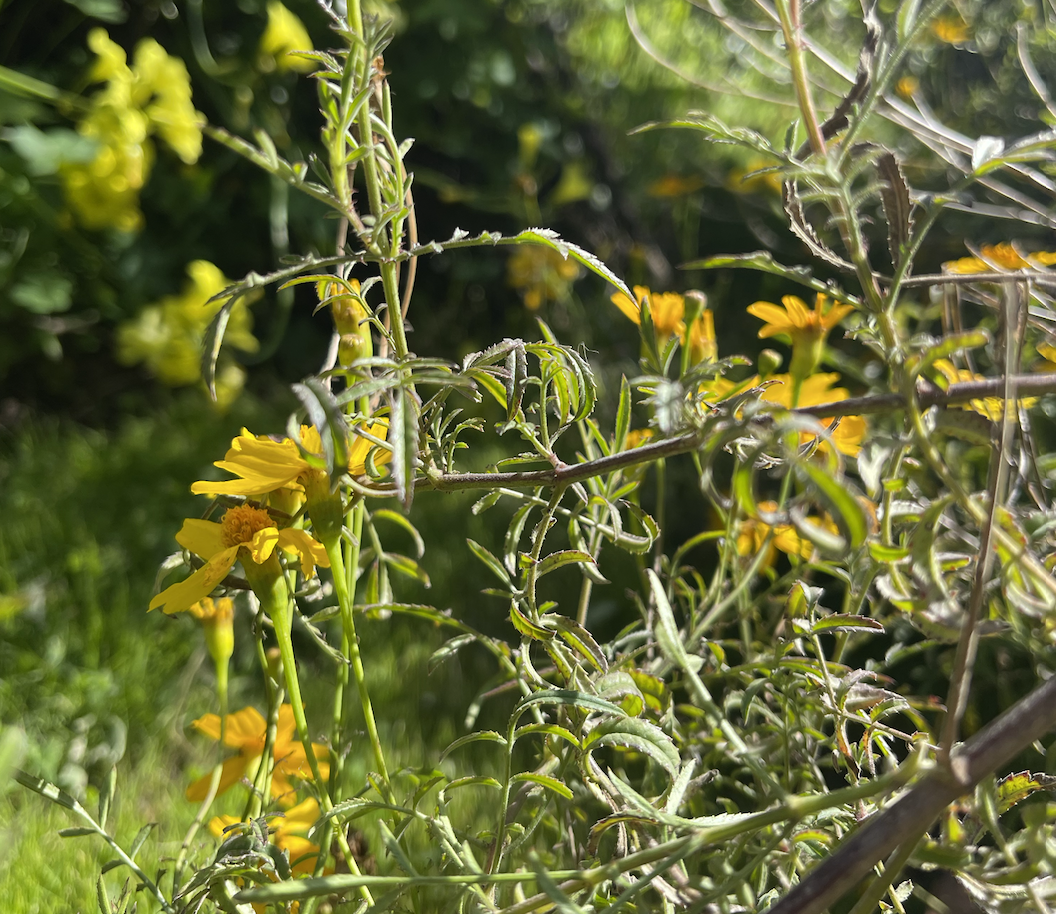Part 1: The Art of Grief at Work: Tending to Your Sorrow and Self
Birthday Grief Altar
Spencer’s Patio, Sayulita, Mexico
Photo by Tim Baldwin (Spencer’s friend)
This was the most difficult post to write amidst this series on loss and grief in the workplace. Since the tragic passing of my beloved father Tito Pamplona Andrada, I’ve spent the past two and half years integrating my grief into my DEI & Mental Health consulting practice. It is a constant work in progress. These survival techniques are rooted in my personal practice of healing alongside my work supporting clients as a leadership coach and workshop facilitator.
Grief doesn’t end when the flowers wilt from the funeral. I tend to my grief like the plants in my garden; they need consistent sunshine, water and sometimes fertilizer. I check the soil regularly and plan for the seasons of change.
Flowers = Nervous System Regulation
Marcom Rose Garden, Oakland, California
Photo by Spencer Ian Harris
1
Gently name your grief at the beginning of a meeting.
There is an extremely powerful healing power in ‘naming’, the practice of acknowledging what is actually going on. I know it can be scary and vulnerable sharing how you actually feel. But when our grief is not given words to speak, it can be a source of shame hidden from the outside world.
“If you put shame in a petri dish, it needs three ingredients to grow exponentially: secrecy, silence, and judgment. If you put the same amount of shame in the petri dish and douse it with empathy, it can't survive.”
— Brene Brown
Language you can adapt for your own needs
“Today is my dad’s birthday, so I’m going through a lot today. I don’t need you to say or do anything, I just wanted you to know.”
“This week is my dad’s death anniversary -- and it’s really hard for me right now. I might need to go off camera or leave the meeting early.”
“I just found a card my dad sent me for Pride years ago, and it’s triggering a wave of grief so I’m wondering if it’s okay if I just sit quietly in this meeting.”
It’s okay to name what you’re feeling and ask for what you need from your team. If it’s hard for you to do this in the moment, you can let people know over Slack, text or email. You also can ask someone to advocate on behalf of you and your grief.
If you’re not used to sharing how you’re feeling in groups, you also can start by sharing how you’re authentically feeling 1:1 with a coworker you feel closer to or more comfortable with. Even one person acknowledging and holding your grief can be hugely powerful.
I know not everyone might work for an organization or team that is sensitive to their needs, but what I’ve discovered as I’ve named my grief as a facilitator in 100+ workshops through the past 2.5 years is that naming one’s grief builds deeply authentic connections and inspires others to be braver in their grief and mental health challenges.
Standing in Your Truth
General Assembly, New York City: October 2019
Photo by Jesse Whiles
“I am sorry about your loss and hope you are finding peace where and when you can. I lost my mother 18 months ago and my father in law right at the start of covid. We all experience grief and loss differently, so I know I don’t know what you have experienced or are experiencing right now. That being said, your sharing openly connects to my recent experiences and reminds me to bring that whole part of myself to my colleagues and our work together. Thank you.”
2
Ask for time off and flexible hours during the most difficult seasons and days of grief.
What times of the year might be hardest for you? What personal and collective rituals can you create to make meaning out of these difficult times? Ritual is an important practice for integrating grief into our daily lives.
“Ritual is able to hold the long-discarded shards of our stories and make them whole again. It has the strength and elasticity to contain what we cannot contain on our own, what we cannot face in solitude.”
― Francis Weller, The Wild Edge of Sorrow: Rituals of Renewal and the Sacred Work of Grief
Magic Hour Birthday Grief Ritual at Spencer’s Favorite Beach
Carracitos, Sayulita, Mexico
Photo by Tim Baldwin (Spencer’s friend)
Potential Difficult Days (There are far more than one can list)
Your Birthday
The Birthday of Your Loved One
Death Anniversary
Wedding Anniversary
Valentine’s Day
Father’s Day
Mother’s Day
Pride Month
Christmas
Thanksgiving
New Year
Dia de Los Muertos
The fall & winter months
I know the months from November to January are the most difficult for me. As the days get shorter and darker, the holidays and end of year can evoke a lonely introspection. I hold these days sacred; they are my own personal organizational holidays.
December 4: The death anniversary of my father Tito Pamplona Andrada
January 22: The death anniversary of my dear friend and grief photographer Spencer Ian Harris.
January 26: The birthday of my father
March 26: My shared birthday (and birthdate) with Spencer
For my dad’s death anniversary, my annual ritual is to fly to Seattle to be with my mom and visit his grave. While his passing occurred in California, his body was eventually airlifted to Washington and the funeral took place in Seattle. When I think of his passing, I think of the beginning tidings of Christmas -- raspberry hot chocolate, the smell of pine trees, a blanket of fresh snow. During our visit to the cemetery, my mother will usually say a prayer while Facetiming my sister and nieces from Brooklyn. I will re-read the latest authentic expression of his eulogy and hug an evergreen in his honor.
Big Sur, California: November 2022
Photo by Spencer Ian Harris
3
Ask for support. Create a Grief Listening Tour and Ritual with people on your team and in your community.
Asking for support is so simple yet can be profoundly hard. Grief goes in waves -- we might not know when a gigantic wave might emerge from the swell of life. (I’m a surfer; the language of surfing lends it so well to the language of grief.)
“You are worthy of support.”
Whilst I was on a grief sabbatical in Sayulita, Mexico, five months after my dad’s tragic death, I organized a Grief Listening Tour, a practice of pre-scheduled weekly calls with my community where the entire agenda is centered around holding and supporting my grief.
Every few days for almost a month, I talked to a different person -- sometimes the same people, some of whom were former clients and colleagues, many of whom had endured the loss of a loved one.
Grief can be an incredibly lonely experience; having an organized call every few days made me feel less alone on the journey. It also helped me normalize the practice of talking about grief at work.
Sample request for support, feel free to borrow and alter language
“I need your support after the unfair and life-altering death of my father. I’m taking it day by day; hour by hour. I’m wondering if you might join my community of support to hold space for a call around my grief where the request is to simply listen. I don’t need you to problem solve, give advice, analyze what happened or make me feel better. I just want you to be with my sorrow and sadness so I don’t have to do it alone. Thank you for being there. <3”
Photo by Tim Baldwin (Spencer’s friend)
As my grief has matured and evolved, I’ve been tending to my grief by setting up monthly 1:1s, what I call Grief Garden Talks, with a hyper-curated set of friends who are skillful and compassionate listeners to specifically hold space around trauma and grief. This time is not necessarily focused on a mutual life catch-up exchange (although if the conversation evolves naturally in that direction, it’s okay); always ask for consent when you’re serving as the space holder). These conversations also don’t need to just be about sorrow; they can also hold the joy and memories of grief. I often love re-reading the eulogy and recounting memories of my father.
4
Share compassionate feedback when people say things in response to your grief that feel hurtful.
I call these ‘Grief Microaggressions’ — unintended violations of the soul that often seem innocuous to the person committing the microaggression.
This often takes the form of generic and glib condolences that invalidate the painful feelings the bereaved may be holding:
In response to the loss of my father:
Statement: “Don’t feel sad. Your dad wouldn’t want you to be sad.”
Why it’s hurtful: It makes me feel sadder and unsupported. It invalidates healthy emotions that are a natural part of grieving.
Statement: “It’s time to move on.”
Why it’s hurtful: It makes me feel angry and unsupported. Grief is a lifelong process; it doesn’t go away.
In response to the loss of my dear friend and grief photographer:
Statement: “You’ll find a new photographer.”
Why it’s hurtful: It makes me feel angry and unsupported. Each person is unique, each relationship is singular. I can find a new photographer but will never be able to see Spencer again, he saw me and captured my essence in a way that no one else will.
Other examples of grief microaggressions at work
Lack of acknowledgement surrounding the death
Making people feel ashamed of tears or difficult feelings
Expecting people to function at peak performance at work with no change in support
Making people feel guilty for taking time off
Tactics for skillfully sharing feedback on Grief Microaggressions
Focus on the impact on you without shaming or blaming — and if you feel centered and comfortable, share more vulnerable context for why it matters. Consider making a request.
Before you speak, take a few breaths, making your exhale longer than your inhale. The longer exhalation helps activate the parasympathetic nervous system, the system that regulates rest and sleep, signaling to your body that you are safe. Connect to your most compassionate and courageous expression of self.
Grief Microaggressions Framework
Personal Impact
“It hurts me when you say or do.”
“I felt hurt when you…”
“It felt painful when…”
[insert language or behavior that caused hurt or harm]
Vulnerable Context
“As it…”
“Because…”
“You might not know…”
“I care about our relationship, so I want you to…”
[insert vulnerable context]
Compassionate Request
“Can you..?”
“Will you..?”
[insert request]
Example Messaging
Yoga Teacher Training Graduation
Sayulita, Mexico: April 2021
Photo by Yoga Teacher Training Participant
“It hurts me when you say I’ll find a new photographer, as it invalidates the pain resulting from the traumatic death of someone important to me.
I want to help you understand what it feels like to grieve the person helping me grieve.
He wasn’t just my photographer; he was my healing arts collaborator, a critical part of my business and life.
In the future, I’d appreciate it if you could avoid saying that I’ll find a new photographer.”
Giving feedback, especially in response to your grief, is hard even when your day job is in part to train people to have difficult conversations. But I’ve found it builds even more impactful conversations and relationships.
“Thank you for sharing your feedback and poetry. That is to say, your wisdom, heart, beauty and grace.”
Amidst the quick pace and pull of all the energies around us, I appreciate your calling for me (and I imagine all around who will hear the call) to tend better and care with greater sensitivity.”
— Dear friend’s text after receiving feedback on a Grief Microaggression
5
Get professional support. See a skillful grief-specific therapist or coach, join a values-aligned grief group.
This learning might seem obvious, but the nuance comes through having an awareness of what you need. As both a receiver of professional grief support and a professional space holder for the grief of others, here’s what I’ve learned.
The benefits of 1:1 grief therapy and coaching are that the attention and support are focused entirely on you. During the first year and a half of my grief, I needed to take up all the space and found it difficult to be in community and support others in their own grieving. Part of the downsides are the cost and becoming codependent on someone you’re paying to hold space for you.
The value of grief group therapy or support is knowing you’re not the only one deeply suffering and feeling less alone in your grief. It can hold a mirror to different parts of your grief; however, the mirror might be quite painful if you’re not emotionally ready and compassionately resourced to look at those parts, particularly if ‘the container’ isn’t well held by the facilitator, coach or therapist.
Paddle Out with City Surf Project
Crissy Field, San Fransisco, California: January 2021
Photo by Paddle Out Participant
Questions to ask yourself as you’re looking for a grief therapist, coach, healer or support group
What style of therapy, coaching or healing might you want to explore?
For example, writing & narrative-based therapy, yoga therapy, drama therapy, somatic coaching, brainspotting, NLP, EMDR, EFT Tapping, breathwork, Reiki, meditation, plant medicine, etc.
Perhaps, you’ve never heard of these modalities before, as mainstream therapy and mental health focuses on cognition and CBT.
The latest research in psychology, particularly by Bessel Van Kolk’s work in The Body Keeps Score, shows that trauma is stored in the body and has to be healed through the body, not just the brain.
What identities might you want to share with your therapist, coach or grief group?
Gender
Race
Sexuality
Nationality
Language
Ability
Economic Upbringing
Religion
For me, it was important to work with a queer somatic therapist of color to hold the grief not just surrounding my father but also the grief surrounding my marginalized identities as a queer and gender-questioning Filipina American born in Nigeria who came to the States as an undocumented immigrant. My therapy practice was also supported by a medley of executive coaches sharing my identities as a recovering overachiever Asian American female assigned at birthday, most notably Dorothy Liu and Tricia Bolender.
Areas of Expertise
Grief brings up mindful mortality, holds a light to our other unprocessed wounds. What other areas might you want support beyond grief?
Life Transitions
Depression & Anxiety
Confidence & Self Esteem
Chronic Illness, Pain & Sleep
Addiction & Substance Abuse
Sex & Intimacy
Trauma & Post Traumatic Stress Disorder (PTSD)
Domestic Abuse & Violence
What is your specific type of loss?
Parent / Mother / Father / Godparent / Chosen Parent
Grandparent / Grandmother / Grandfather / Chosen Grandparent
Sibling / Sister / Brother / Chosen Family
Aunt / Uncle / Chosen Family
Niece / Nephew / Nibling / Chosen Family
Daughter / Son / Child / Chosen Family
Friend / Chosen Family
Mentor / Teacher / Coach / Therapist / Healer
Priest / Rabbi / Spiritual Guide / Chosen Family
Romantic Partner / Chosen Family
Artistic Partner / Chosen Family
Business Partner / Chosen Family
Sports Partner / Chosen Family
Colleague / Team Member / Chosen Family
Pet / Dog / Cat / Rabbit / Chosen Family
I know folks in my community have also sought to grieve with a bereaved community who can relate directly to the way in which the person died — such as, cancer, suicide, car accident, etc.
Take a deep breath, connect to your body. I know this content might be heavy to read and hold.
In conclusion
There are far more ways to support yourself in times of enduring grief, far too many words to share in a singular, short-form post. I know grief can feel so incredibly lonely and painful. And I want you to know you’re not alone if you feel alone and it’s okay if you’re not okay.
I’ll leave you with a message from my beloved father, a message found whilst searching through a multi-year archive of iMessages I wanted to screenshot to keep his memory alive:
“Stay on hope lane always.”
Sayulita, Mexico: April 2021
Photo by Spencer Ian Harris
Get in touch if you’d like support on your grief and healing journey through 1:1 coaching or gentle yoga session
Melissa Andrada (Mel - she/they) is a trauma-sensitive DEI Consultant, Keynote Speaker, Workshop Facilitator, Yoga Teacher and Leadership Coach, alchemizing the grief for her beloved father Tito Pamplona Andrada and dear friend Spencer Ian Harris into healing for others. They are currently pursuing a Masters in Expressive Arts Therapy with a concentration on grief at the California Institute of Integral Studies.








